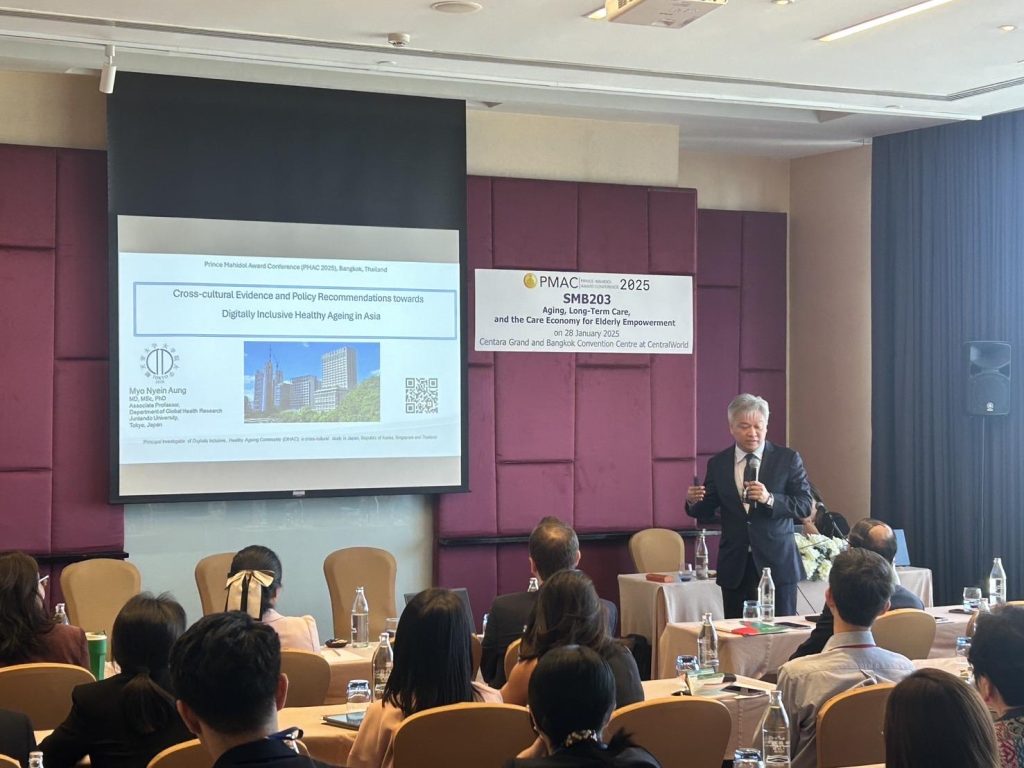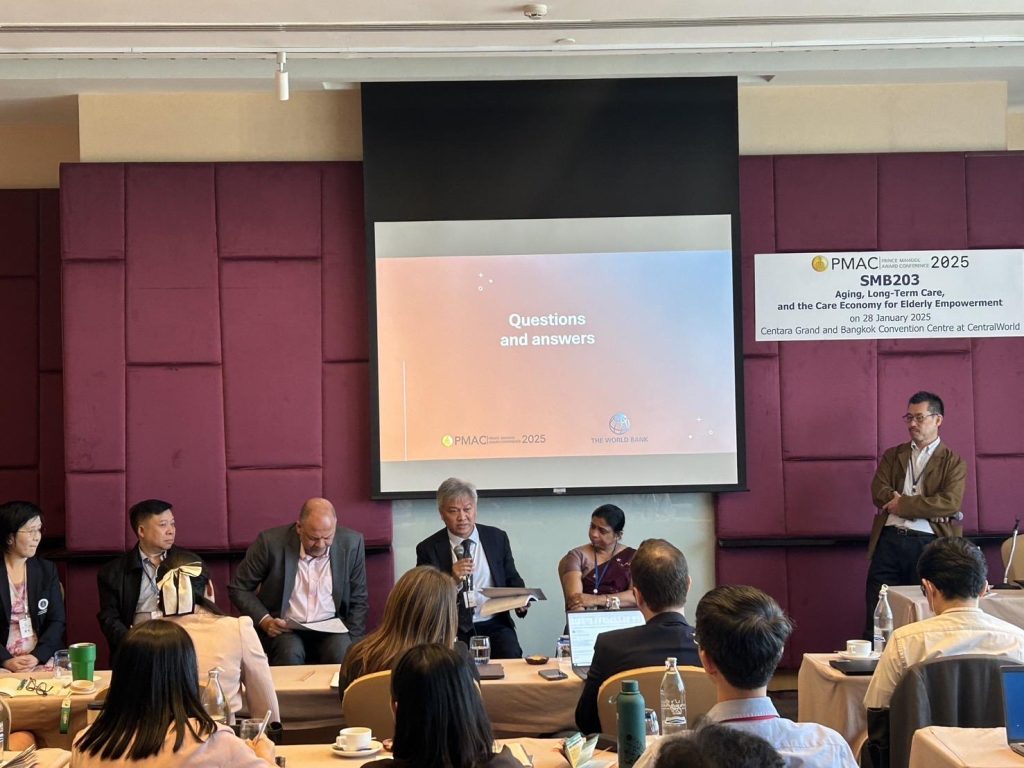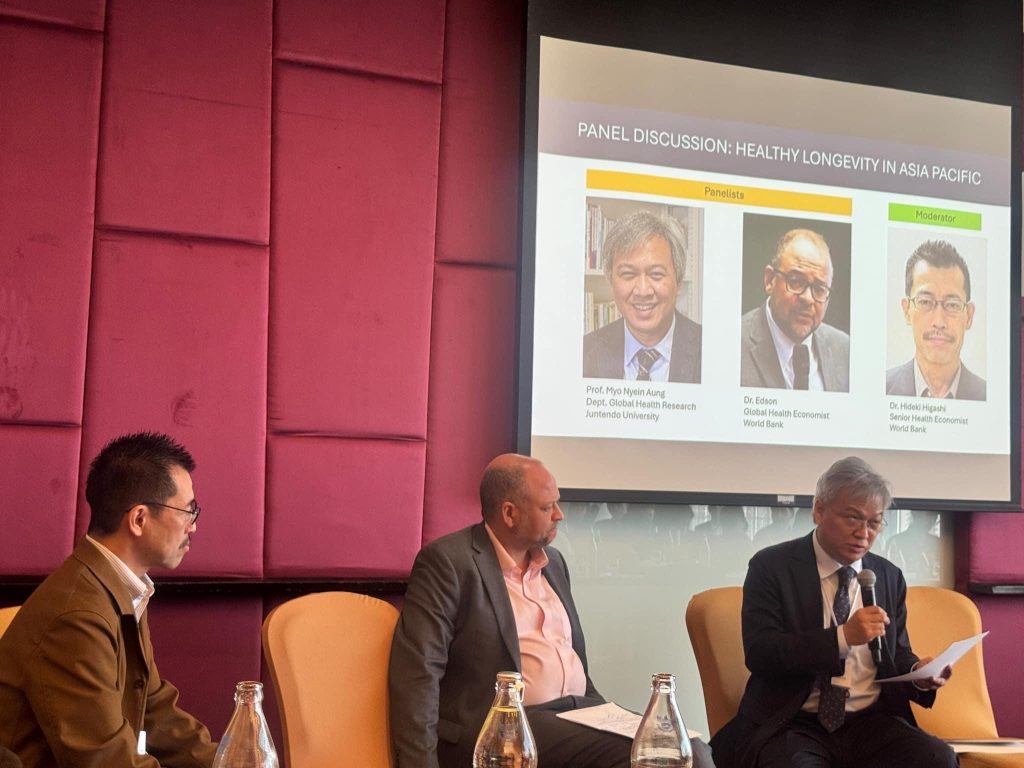DIHAC study presentation at Prince Mahidol Award Conference (PMAC) 2025, collaboration with the World Bank Group
The World Bank Group organized a conference side meeting at the Prince Mahidol Award Conference (PMAC) 2025 “Harnessing Technology in the Age of AI to Build a Healthier World”, held from 28 January to 2 February, 2025 at Centara Grand & Bangkok Convention Centre at CentralWorld in Bangkok, Thailand. Under the session “Aging, Long-Term Care, and the Care Economy for Elderly Empowerment”, the conference focused on healthy ageing and digital inclusion. The Principal Investigator of the DIHAC study, Associate Professor Myo Nyein Aung, Department of Global Health Research, Juntendo University was invited to present the findings of the Digitally Inclusive Healthy Ageing Communities (DIHAC) study and contribute panel discussion on ageing and long-term care.
Information about the PMAC conference
 Fig 1: Presentation of Professor Myo at Prince Mahidol Award Conference(PMAC) 2025 side meeting organized by the World Bank in Bangkok, Thailand – January 28, 2025
Fig 1: Presentation of Professor Myo at Prince Mahidol Award Conference(PMAC) 2025 side meeting organized by the World Bank in Bangkok, Thailand – January 28, 2025
The session was opened by Ms. Anna Kozieł, Senior Health Specialist in the Health, Nutrition and Population Global Practice at the World Bank, based in Warsaw. In this conference, Professor Myo presented alongside Dr Christopher H. Herbst, the World Bank’s Program Leader for Human Development in the Gulf Region; and Dr Varalak Srinonprasert, Head of the Siriraj Health Policy Unit, Faculty of Medicine Siriraj Hospital, Mahidol University, Bangkok, Thailand.
Professor Myo gave a presentation entitled “Cross-cultural evidence and policy recommendations towards digitally inclusive healthy ageing in Asia”. In his presentation, findings of the Digitally Inclusive Healthy Ageing Communities (DIHAC): A cross-cultural study in Japan, Republic of Korea, Singapore and Thailand were shared to the international participants, government officials and researchers. Professor Myo gave an overview of grey digital divide, the unique findings in each country of the DIHAC study. He shared contemporary advances in digital inclusion for the older persons, with different model of empowerment programmes in different cities. The discussant Mr. Charkhris Phomyoth, CEO of Young Happy, Thailand presented the activities of Young Happy for empowering Thai older persons’ digital skills.
 Fig 2: Distinguished Speakers at the Prince Mahidol Award Conference (PMAC) 2025 conference side meeting organized by the World Bank
Fig 2: Distinguished Speakers at the Prince Mahidol Award Conference (PMAC) 2025 conference side meeting organized by the World Bank
In the latter part of the conference, the Panel discussion was moderated by Dr. Hideki Higashi, a Senior Economist for Health, Nutrition and Population, covering Sri Lanka and other countries in South Asia. Panelists were Professor Myo and Dr Edson C Araujo, senior health specialist, the World Bank’s task team leader in Brazil, Guinea-Bissau. They discussed healthy longevity in Asia-Pacific region, with a particular focus on care economy and healthy ageing. In the panel discussion, Professor Myo discussed the successes and challenges of ageing and long-term care in Japan and exchanged experiences from Brazil, Sri Lanka, Thailand and Vietnam. He explained current efforts to narrow the gap between life expectancy and healthy life expectancy, and inequalities between cities. He also shared the growing demand for care due to the very high prevalence of dementia in Japan, which is much higher than in other OECD countries. The section was closed by Dr Kate Mandeville, a senior health specialist based in the World Bank’s Beijing office.
 Fig 3: Professor Myo Nyein Aung and Dr Edson C Araujo giving a panel discussion moderated by Dr. Hideki Higashi, at the PMAC 2025 side meeting organized by the World Bank
Fig 3: Professor Myo Nyein Aung and Dr Edson C Araujo giving a panel discussion moderated by Dr. Hideki Higashi, at the PMAC 2025 side meeting organized by the World Bank
In recognition of our recent presentation, we extend our heartfelt thanks to the organizer World Bank Group for the invitation, highlighting DIHAC study’s findings to a wider audience.
